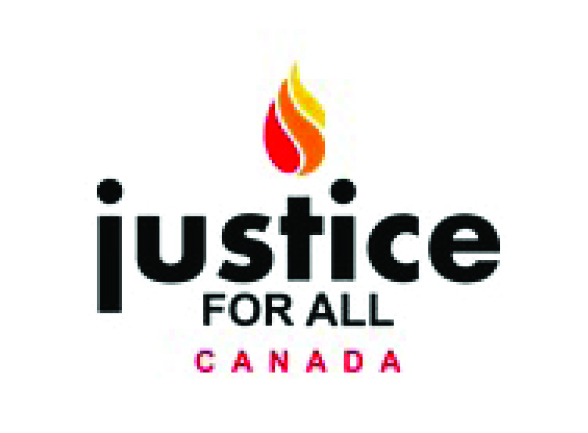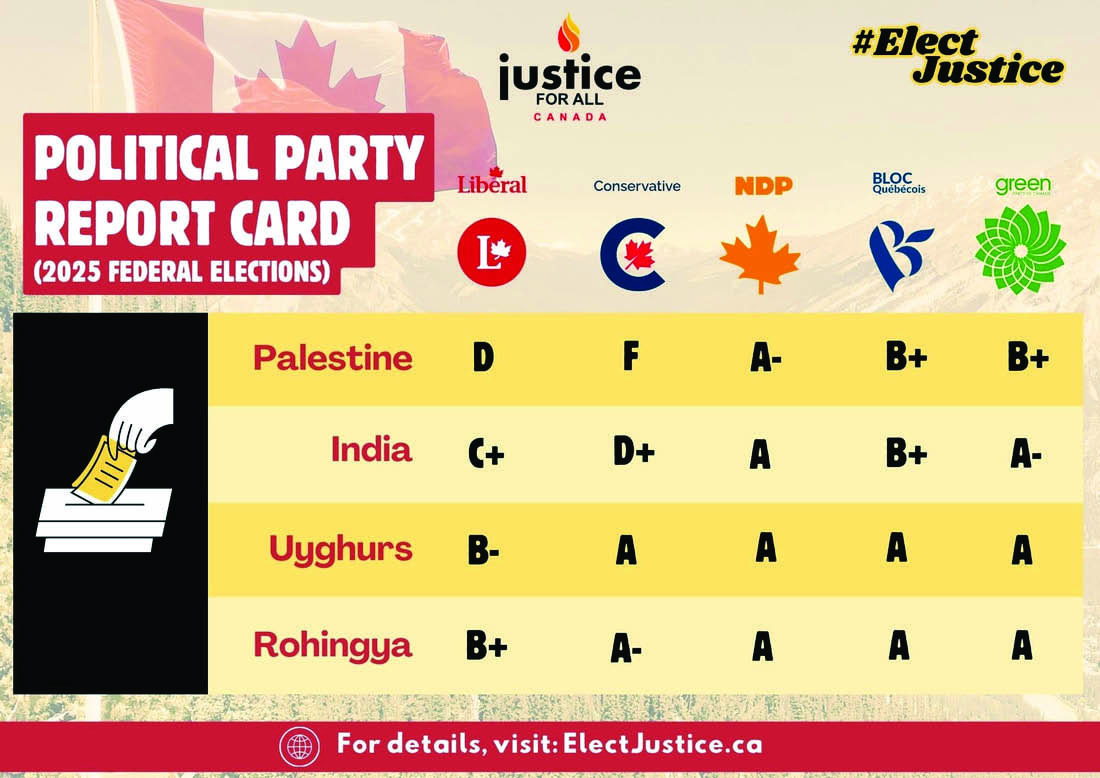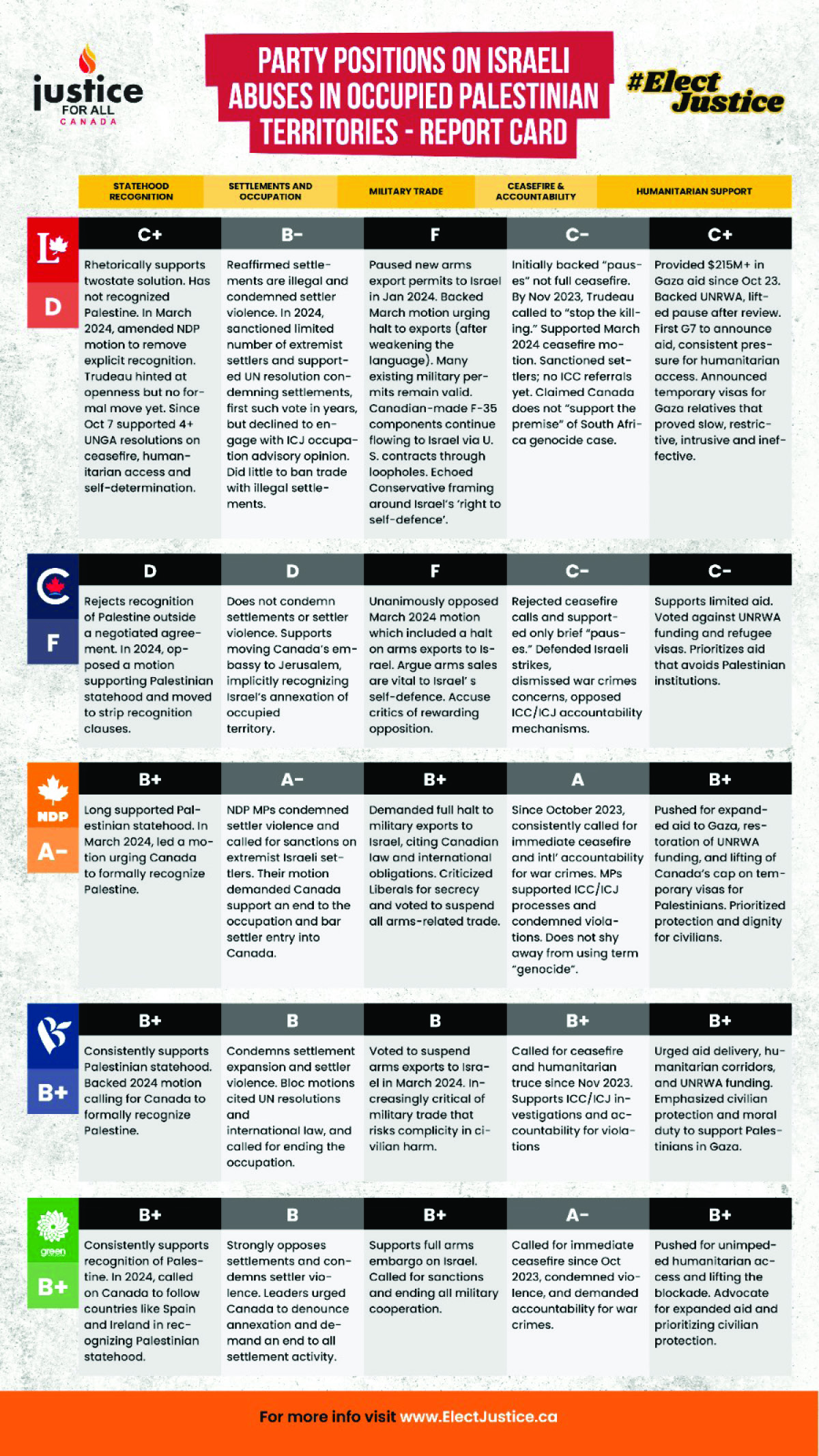
Justice For All Canada Releases 2025 Federal Election Report Card on Israeli Abuses in Palestine
4-16-2025
 Email
to a friend Email
to a friend
 Post
a comment Post
a comment
 Print Print
TORONTO — As Canadians prepare to head to the polls in 2025, Justice For All Canada has released a critical report card evaluating how the country’s major political parties have responded to the ongoing Israeli-led violence in Gaza and the Occupied Palestinian Territories.
The report, titled "Election 2025: Israeli Abuses in Occupied Palestine – Report Card," assesses party records on a range of pressing human rights and international law issues. Drawing from parliamentary records, public statements, policy positions, and direct actions, the report provides voters with a clear tool to evaluate political leadership on one of the world’s most urgent crises.
“We want this to be a resource for voters who care about justice, international law, and the rights of Palestinians,” said a spokesperson from Justice For All Canada. “Our aim is accountability — and informed decision-making.”
________________________________________
Grading the Parties
The report evaluates the five major federal parties — the Liberals, Conservatives, New Democrats, Bloc Québécois, and Greens — across five key policy areas:
• Recognition of Palestinian statehood
• Position on Israeli settlements and military occupation
• Arms exports and military trade with Israel
• Support for ceasefire and international accountability
• Humanitarian assistance to Palestinians, particularly in Gaza
Grades were based on actions and public stances since October 7, 2023. The report prioritizes concrete measures over rhetoric, with extra weight given to legally urgent issues like arms embargoes, war crimes investigations, and genocide accountability.
________________________________________

Party Performance Highlights
Liberal Party:
The Liberals showed some progress, notably in their 2024 UN voting record — breaking with years of abstentions to support resolutions affirming Palestinian rights. However, critics point to inconsistencies: Canada abstained on a UN vote seeking an International Court of Justice (ICJ) opinion on Israeli starvation tactics in Gaza and failed to support South Africa’s genocide case at the ICJ. While new arms export permits were paused, existing permits — including for surveillance tech and weapons components — continued. Their humanitarian visa program for Gazans has faced major implementation issues, with fewer than 600 arrivals. Liberal language remains vague, with no clear condemnation of Israeli war crimes.
Conservative Party:
The Conservatives have firmly backed Israel, resisting calls for ceasefires and opposing restrictions on arms exports. Their stance often dismisses Palestinian civilian suffering, casting critiques of Israeli policy as threats to Israeli security or antisemitism. The party has rejected war crimes investigations and has shown little support for international legal accountability. While they supported some humanitarian aid, they have clearly separated this from any pressure on Israeli actions. Their record suggests unwavering support for Israel and a lack of concern for international law.
New Democratic Party (NDP):
The NDP has consistently led calls for a ceasefire, arms embargo, and international accountability. MP Heather McPherson’s 2024 motion was among the first to directly challenge Canadian complicity. The NDP supported all major UN resolutions affirming Palestinian rights and backed the ICJ and ICC processes. The party has called out Liberal contradictions and advocated for humanitarian access, while also pushing for improvements to Canada’s flawed visa program. They have been willing to say that Canada’s policies are contributing to Palestinian suffering. The NDP also pushed for stronger humanitarian pathways and questioned the government’s continued trade with Israeli settlements. MP Jagmeet Singh has faced backlash from lobby groups and political opponents for the party’s stance, but they’ve held their ground. Despite political backlash, the NDP has maintained a principled position.
Bloc Québécois:
The Bloc has supported key UN votes, a Gaza ceasefire, and the March 2024 arms embargo motion. Though their stance is more reactive than proactive, they have consistently voted in favour of international legal accountability. However, they have not strongly amplified grassroots calls for justice or introduced major initiatives themselves.
Green Party:
Green MPs Elizabeth May and Mike Morrice introduced an early ceasefire motion and have been vocal in Parliament and the media. They support UNRWA funding, an arms embargo, and South Africa’s genocide case. The party has also questioned Canada’s complicity through military exports and emphasized the need to uphold the Genocide Convention. Their smaller platform has limited reach, but their message has been consistent and rooted in international human rights law.
________________________________________
A Living Document for Accountability
Justice For All Canada emphasizes that this report card is not exhaustive but reflects the most crucial indicators of party action and inaction. It is intended to evolve as the political situation shifts.
“With genocide allegations under international investigation and mass civilian casualties mounting, Canadian voters must demand clarity, compassion, and courage from their leaders,” the organization said. “This is not a foreign issue — it’s a human issue. And Canada has a role to play.”
The full report card is available at: https://www.justiceforallcanada.org
Read More: Israeli Abuses in Occupied Palestine: Report Card - Justice for All Canada

|